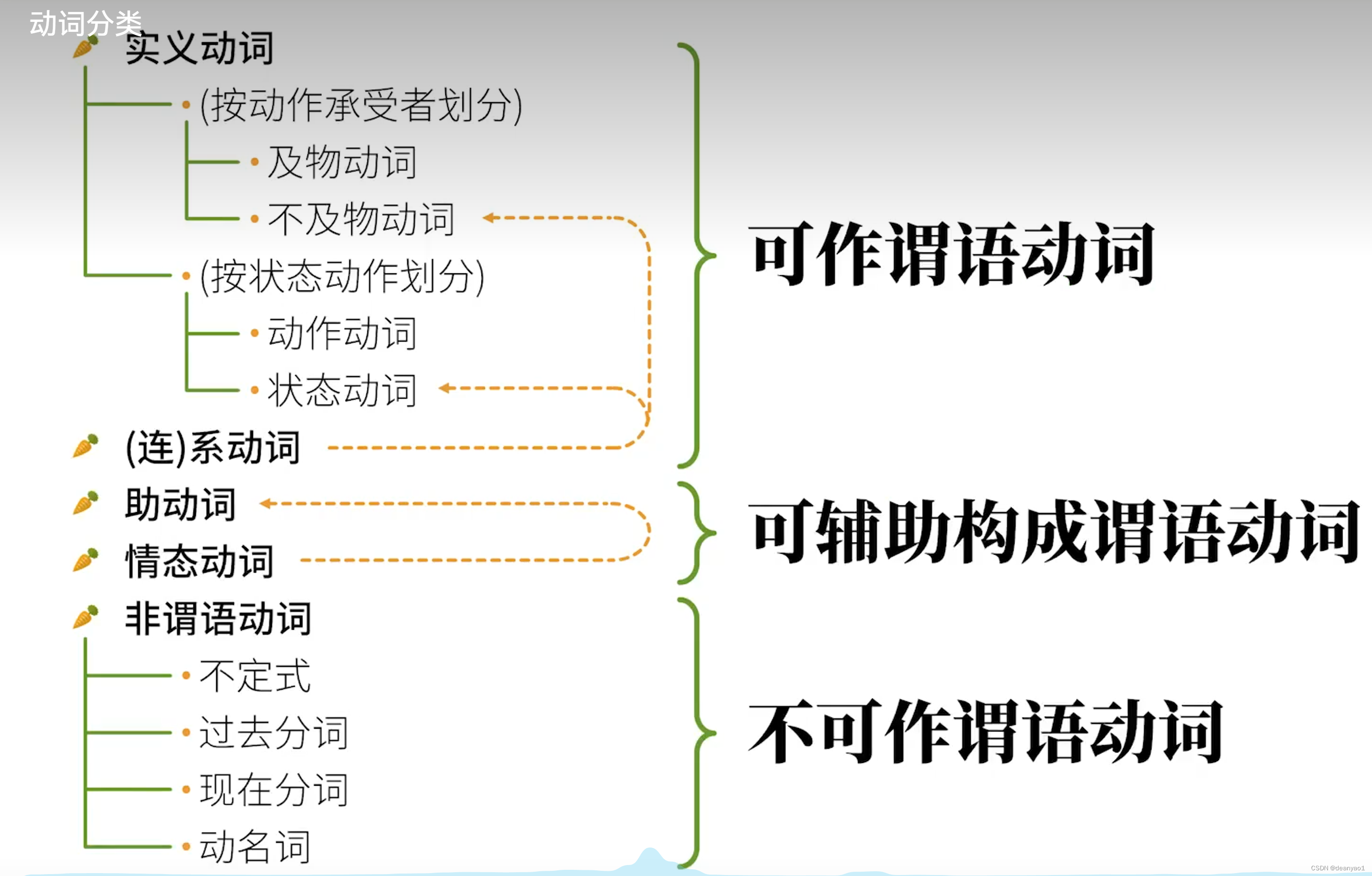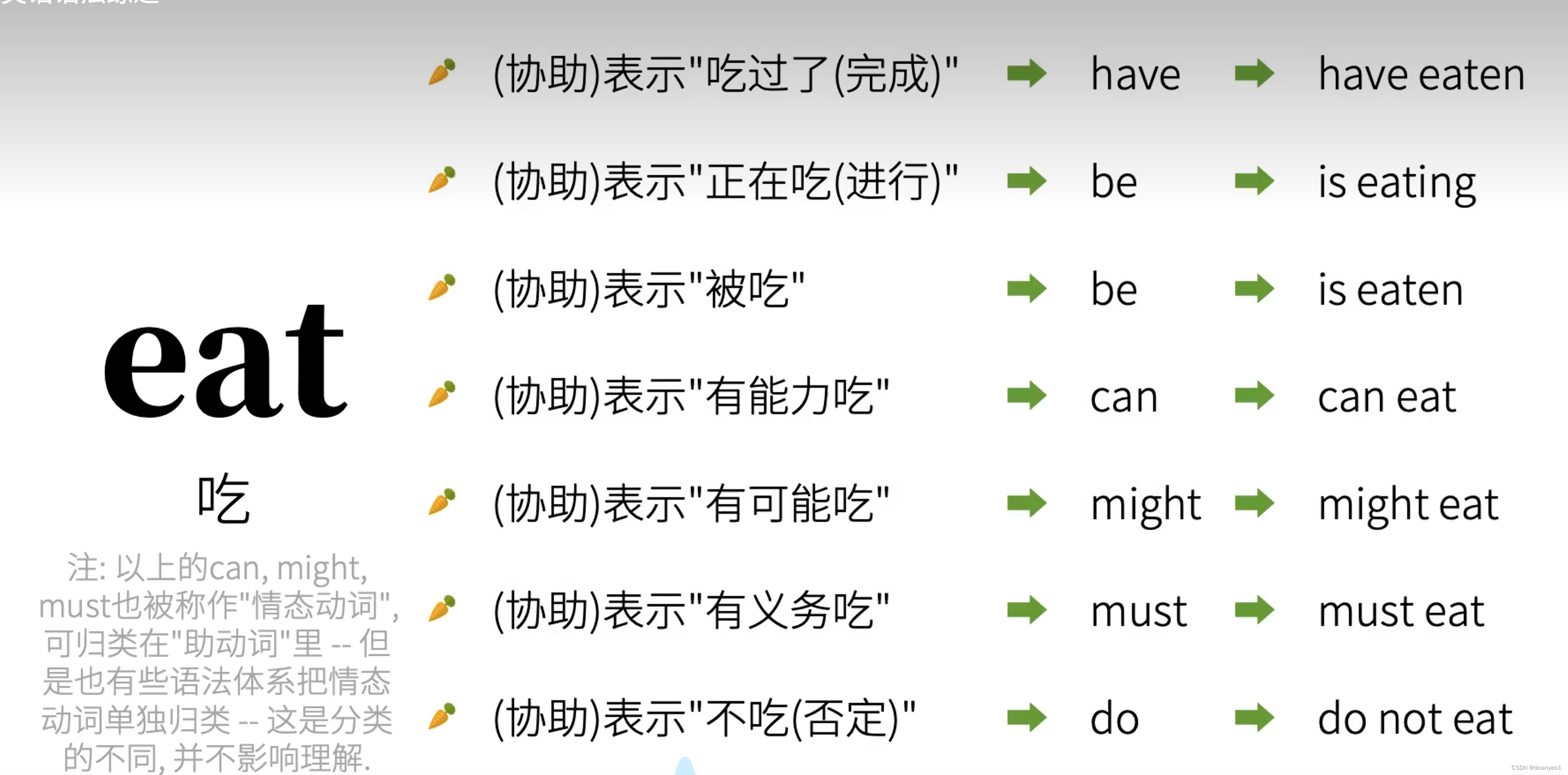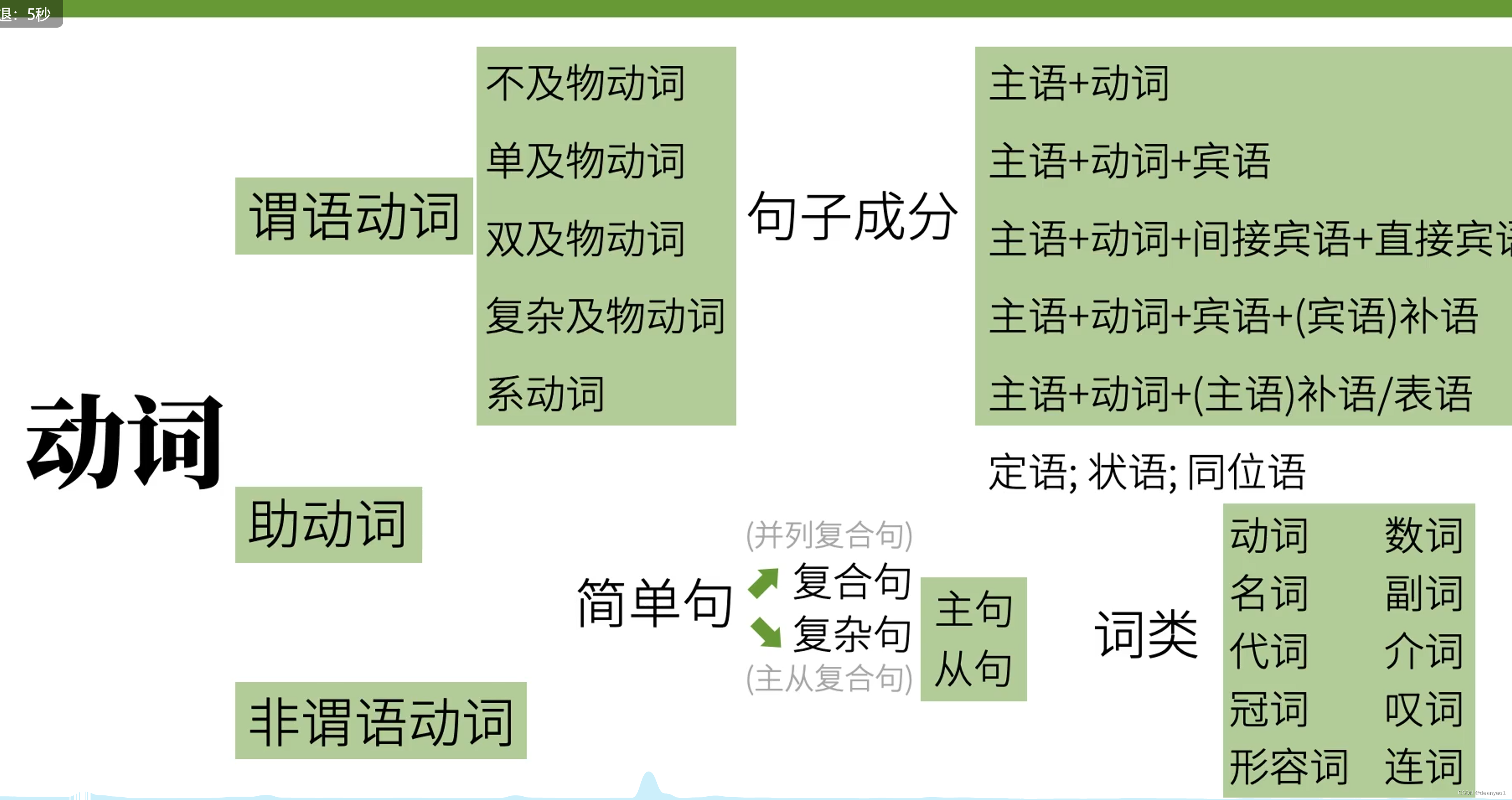- 英语语法学习计划安排:
- 视频时间 8h , 学习计划 8 天; 2022 年 12 月 12 号 到 2022 年 12 月 20 号
- 英语兔 ---

在这里插入图片描述
D1 2022-9-3
句子成分 z
- subject 主语
- predicate verb 谓语动词
- object 宾语
- object complement 宾语补语
- subject complement 主语补语
- attributive 定语
- adverbial 状语
- appositive 同位语
句子的成分 和 单词的词性没有一一对应的关系
句子分类
- 按照结构复杂度分类
- 简单句
- 复合句
- 复杂句
- 用途
- 疑问句:一般疑问句 特殊疑问句 选择疑问句 反义疑问句
- 陈述句
- 祈使句: eat the carrot!
- 感叹句 :
词类
- verbs 动词
- Nouns 名词
- articles 冠词
- pronouns 代词
- adjectives 形容词
- numerals 数词
- advervs 副词
- prepositions 介词
- interjections 叹词
- conjunctions 连词
谓语动词 Tense Aspect Mood
1. 动作时间 Tense
2. 动作状态 Aspect
3. 动作假设,情感 Mood
五大类谓语动词
- 五大句型
- the rabbit slept
- the rabbit ate a carrot
- the rabbit gave the wolf a carrot
- the rabbit considered the carrot tasty
- the rabbit is smart
谓语动词细分
- 可做谓语动词
- 实义动词
- 按动作划分
- 及物动词
- 不及物动词
- 按状态划分
- 动作动词
- 状态动词
- 按动作划分
- 系统词 linked
- 实义动词
- 辅助构成谓语动词
- 助动词
- 情态动词
- 非谓语动词
- 不定式
- 过去分词
- 现在分词
- 动名词
一个简单句只能有一个谓语动词(表达时体气),其他的只能以非谓语动词出现,
助动词 auxiliary Verbs
协助 动词完成 特定功能 
verbs 动词的重要性 ,贯穿整个英语语法
时态: 16 种时态
现在时间的四种时态:
-
一般现在时:
simple present tense: 与过去和将来无关,-
表达事实 :
- I eat carrots ; 我吃胡萝卜 //
- The rabbit eats carrots ; 兔子喜欢吃胡萝卜
- the sun rises in the east.
- 一般不使用 == i eat a carrot I go to lunch , I eat a carrot now==
-
表达习惯/重复的动作:
- I paly basketball ; 我打篮球 (我有这个习惯)
-
表示预计发生的事情;
- the bus leaves at 8p.m every day;
-
-
现在进行时态:
present progressive tense; 助动词 be 的变位+动词的现在分词 -
现在完成时台:
present perfect tense助动词 hava 的变位 + 动词的过去分词过去分词past participle不等于过去时 past/preterit
-
现在完成进行时态:
present prefect progressive tensehava 的变位 + been + 动词的现在分词
I eat carrots I am eating a carrot; I have eaten carrots ; I have been eating carrtos 我正在吃胡萝卜, 不但已经吃了些,还将继续吃
过去时间的四种时态
- 一般过去时态
simple past tense: 动词过去式表示 动作发生了 ,
- 过去进行时态
past progressive tense: 助动词 be 的变位 + 现在分词 - 过去完成时态 :
past perfect tense: - 过去完成进行时态:
past perfect progressive tenseI eated carrots; 我吃过了 胡萝卜 I was eating carrots; 过去某个时间点 我正在吃胡萝卜 I had eaten a carrot ; 过去某个时间点 我已经吃过了胡萝卜 I had been eating a carrot ; 过去某个时间点,我已经吃了点胡萝卜 ,我还要继续吃
将来时间的四种时态 will
- 一般将来时:simple future tense ; will + 动词原形
- 将来进行时态: future progressive tense ;
- 描述: 在将来某个时间, 某个动作是在进行的过程中;
- I will be eating a carrot for lunch tomorrow from 1pm to 3pm;
- 将来完成时态 future perfect tense ;
If suddently you forget me , Do not look for me, for I shall already have forgotten you;
- 将来完成进行时态:
future prefect progressive tense
I will eat a carrot; I wii be eating a carrot ; 将来某个时间点,我正在吃胡萝卜 I will have eaten a carrot ; 将来某个时间点, 我已经吃了胡萝卜 I will have been eating carrots ; 将来某个时间点,我已经吃了点胡萝卜,我还要继续吃
过去将来时间的四种时态 would
相对于过去某个时间点的将来
- 一般过去将来时态 : simple past future tense
- I said I would eat a carrot for lunch
- I knew you would watch my video.
- 过去将来进行时态:past future progressive tense
- 过去将来完成时态: past future prefect tense
- 过去将来完成进行时态: past future prefect progressive tense
语气 moods :
陈述语气: indicative mood
- the rabbit ate the carrot.
祈使语气 imperative mood
- 表示 命名.请求
- Rabbit, eat the carrot;
虚拟语气 mood
-
虚拟语气表示 不可能 假设
- 表示和现在事实相反:
条件句: 过去时 , 主句:would +动词原形If i saw the rabbit now, I would bite him; If i
wereyou, I would give this video a thumbs-up. // 虚拟语气 用 were 不用 was - 表示和将来事实现房 (可能性很小)
条件句: should +动词原形 , 主句:would +动词原形if I should see the rabbit tomorrow , I would bite him; If I should meet thee after long years,how should I greet thee?
- 表示和过去事实相反
条件句: had+过去分词 , 主句:would have +动词过去分词If I had seen the rabbit a few days ago,I would have bitten him; If I had watched this video before , I would hava aced my test ;
- 表示和现在事实相反:
-
虚拟语气表达愿望,请求 建议命令等 ,即希望某个动作发生(wish 可能性小)
- 对现在的愿望: wish + 动词过去式
I wish that I were a rabbit ; I wish that you were here ;
- 对过去的愿望
I wish that I had eaten the carrot;
- 对将来的愿望
I wish that i could eat the carrot ;
- 对现在的愿望: wish + 动词过去式
I would rather that you didn't eat the carrot , 我宁愿你不要吃那根胡萝卜, 现在还没有吃 I would rather that you hadn't eaten the carrot , 我宁愿你过去没有吃那根胡萝卜, 现在已经吃掉了
非谓语动词 non-finite verbs : 没有表达时间和人称的能力
- 非谓语动词: 非核心, 可以做处谓语之外的其他部分, 可以取代 几乎所有从句 简化句子
- 动词 → 谓语动词 核心
I am a rabbit , I eat carrots. => 连词 I am a rabbit , so I eat carrots => 一个简单句中 , 只有一个谓语动词(核心)
动词不定时 infinitive :
to be or not to be, that is the question. you helped me (to) cook the carrot
-
不定式做主语
to eata carrot every day is good for the rabbit . => 不定式做主语 It is good for the rabbit to eat a carrot every day ; -
不定式做宾语
the rabbit likes to eat carrots => 不定式做宾语
-
不定式做宾语补语
the rabbit expected the wolf
to eat a carrotcarrots make the rabbit feel happy => 使役动词 省略 to -
不定式做主语补语
the rabbit's dream is
to eat every kind of carrot in the world.=> is 系统词 : (=)To eatkind of carrot in the world is the rabbit's dream . -
不定式做定语
the rabbit has a lof of carrots
to eat -
不定式做状语
I was surprised to get thumbs-up. // 表原因, I was supprised because I got a thumbs-up. I will do anything to get a thumbs-up. // 表目的 === I will do anything in order that I get a thumbs-up. I got enough thumbs-up to make another video.// 表结果 === I got enough thumbs-up,so that I made another video.
-
高级不定式 : to + 动词原形的状态
The rabbit seemed to be eating a carrot. 这兔子之前似乎正在吃一根胡萝卜 The rabbit will appear to have eaten a carrot, 这兔子之后会看起来像是吃过了一根胡萝卜
动名词:动词原形+ing:相当于名词
-
做主语:
Eating carrotsis healthty for the rabbit; -
主语补语
the rabbit's hobby is
growing carrots.Seeing is believing ; -
定语
a sleeping pill
-
宾语
the rabbit likes eating carrots.
The rabbit is fond of eating carrots the rabbit
is looking forward toseeing the wolf again. // to do be looking forward to doing . /
- to do / doing 区别
The rabbit stopped to eat a carrot. 兔子停下手里的活 去吃胡萝卜 The rabbit stopped eating a carrot . 兔子停止吃一根胡萝卜
现在分词 不带现在时间
- 现在分词相当于
形容词; 动名词 是名词a sleeping rabbit , 正在睡觉的兔子 the story is interesting ; <== interest
- 宾语补足语
forget doing forget to do
过去分词 不带时间概念
The rabbit was frightened. 被动关系 ; 兔子感到害怕 The rabbit was frightening. 主动关系 ; 兔子令人感到害怕
- 非谓语动词:
- 过去分词: 被动/完成
- 现在分词:主动/进行
- 不定式: 将要
独立主格 ()
Because he was invitedby the wolf,the rabbitdecided to go to the party.Invitedby the wolf,the rabbitdecided to go to the party. // 过去分词 表原因 简化 because ,主从句的主语都是 the rabbit 的情况下 ,
- 引导目的原因状语从句
Because the wolf invited him, the rabbit decided to go to the party.the wolf inviting him, the rabbit decided to go to the party. - 引导条件从句
if the weather permits, the rabbit will go out. The weather permitting , the rabbit will go out.
- 引导时间状语从句
After the work was finished , The rabbit went home. The work finished, the rabbit went home
Many animals went to the party , some of them
beingrabbits and wolves. Many animals went to the party , some of thembeinghappy. The rabbit sat on a chair, headbeingdown The rabbit came in , carrotbeingin hand.
with + 宾语 + 宾补
The work finished , the rabbit went home. With the work finished , the rabbit went home.
助动词 Auxiliary Verb
辅助作用 , 需要和实义动词结合起来使用
基本助动词
- be
The rabbit is eating a carrot. // 现在进行时 The carrot was eaten by the rabbit // 被动语态
- have
The rabbit has eaten a carrot // 现在完成时
- do
the rabbit
doeslike coins! the rabbitdoesnot like freeloaders.
情态动词
-
Can /Could
- 表能力:
I can kill a wolf . // 我能杀一只狼 , 将来要不要杀不知道 I could kill a wolf last year. // 去年我能 杀一只狼 ,现在能不能杀不知道
- 表许可
can/could I borrow your book ? -- yes , of course // could 没有过去的含义 ,更礼貌
- 表可能性
The rabbit
could have gonehome earlier, but he didn't finish work on time; // 对过去的虚拟表达
- 表能力:
-
May/might:
- 表许可
May/might I borrow your book ? -- yes , of course // 比 can 更礼貌
- 表可能性 比 can 可能性小
The rabbit isn't here , He may be at home. // 不确信 The rabbit isn't here , He might be at home . //非常不确信
- 表祝愿
May you success. // 不用 might
- 表许可
-
must:
- 表必须:
you must finish your homework first .
- 表禁止
you must not somke here. // mustn't 必须不, 禁止
- 表推测:
the light is on. the rabbit
must beat home // must 的 否定必须要根据情况变化 the light isn't on . The rabbitcan't beat home //
- 表必须:
-
will/would:
- 将来时
- 表示请求, 建议
Will you lend me that book? Would you please lend me that book? // 更礼貌
- 表推测,假设
What would the rabbit eat for dinner ? He would eat a carrot.
-
shall /
- 构成将来时
I shall be there at 9a.m.
- 表请求或征求意见
shall we meet at 9am.
- 表警告 命令
You shall not murder. You shall not steal. You shall not covet. Thou shalt not murder. Thou shalt not steal . Thou shalt not covet . // 中古英语表述
- 构成将来时
-
should:
- 表应当
we should treat the rabbit well. // 应该
- 表有一定根据的推测
It should rain tomorrow.
- 表 竟然
It's surprising that he should be late // 真的很细怪 他
竟然会迟到 - 虚拟语气
You should have eaten the carrot. // 你应该吃掉那根胡萝卜 (实际没有吃)
- 表应当
-
ought to
- 表应当
we ought to treat the rabbit well. // 应该 比 should 语气强一些
- 表应当
-
need (实义动词时表需要)
- the rabbit need wait === The rabbit needs to wait // 后句更常见
-
dare: (实义动词 or 情态) :
敢用于否定、疑问句THe rabbit dare not tell the truth to the wolf . How dare you! // 省略了动词 . 这里还是情态动词
-
used to : 表示过去的动作 强调和现在的对比
The rabbit used to eat apples, Now he only eats carrots.
半助动词
- be able to
- be going to
- be about to
- be to: 命令
- had better
系统词 linking verb 赋值的作用
- 把前后两个概念联系起来
Iama rabbit; the carrot smells nice I smell something , oh no the carrot has gone bad. it smells. //这两个 smell 是实义动词 the room remained empty. the sky grew grey.
使役动词. 使 让 令
- 使役动词 + 宾语 + 宾补
make ; 让某人做某事
I make the wolf
eatcarrots from time to time. // eat 是非谓语动词 , 裸不定式bare infinitive,很多时候看到的动词原形 往往都是裸不定式The carrot made the wolf full.
let 允许某人做某事
I'll let the wolf eat some chocolate // Let me out // out 副词 宾补
have (实义动词 有; 助动词 ; 使役动词,)
I'll have the wolf
washthe dishes ==> I'll have the disheswashed. I had someone wash my car. == > I had my car washed.
get 说服/鼓励 ... 做...
I'll get the wolf
to cleanthe kitchen after she washes the dishes. // full infinitive
I'll have someone wash my car for 1Yuan . // 我会让人 1 块就把我车洗了 hava 任务/职责 I'll get the wolf to wash my car for free. // 我会 想办法 让 浪免费给我洗车 I'll get someone to wash my car for 10Yuan. // 我会说服某人 100 块就把我车洗了 , 隐含占了便宜..
冠词 (中文说英语常见错误)
- 春天 : a spring / the spring / spring
不定冠词 a/an
-
发音:
- 辅音
音素: a rabbit ,a university - 元音
音素:an apple ,an hour
- 辅音
-
用法:
-
泛指 某一个人或 物 ,当泛指的时候 就不永 一个 一只 来翻译了
a rabbit is smarter than a wolf. // 在某些语境下可能会有歧义 , 最好用零冠词
-
表示数字 1.
-
主谓一致
a teacher and video creator a teacher and a video creator
-
固定用法
hava a good time as a result in a hurry all of a sudden
-
定冠词 the (发音不同)
- 发音:
- 辅音
音素: [ðə] - 元音
音素:an apple ,the hour[ði]
- 辅音
- 用法:特指某个人或某些特定的物 ,对话者都知道的物
- 再次提到的物
I saw a rabbit , a rabbit ran fast. // 迷惑 这里难道有两只兔子么? I saw a rabbit ,the rabbit ran fast.
- 用在序数词 和形容词最高级前
the first rabbit the
- 独一无二的事物
the great wall
- 泛指
The computer has changed our way of life. // 计算机改变了我们的生活 泛指计算机 // 最好还是改成 computers 零冠词
- 在形容词前
the poor , the rich
- 固定表达
all the time all the way out of the question
- 再次提到的物
零冠词 泛指 不容易引发歧义
-
复数泛指:
A rabbit is smart . Rabbits are smart. Computers have changed our way of life. water is important // 不可数 当成可数名词理解 泛指
-
泛指概念
summer is hot , winter is cold.// 具象的需要复数 , 抽象的是单数 play football // 这里的 football 指的是
足球运动这种抽象概念, 而不是特指某一个具象的足球 play the piano , play a piano , play piano play flute I like geometry in spring in August on Monday -
专有名词:
Papa rabbit
-
泛指抽象
we breathe air Summer is hot, Winter is cold.
-
固定表达
from time to time out of question -- out of the question 两者意义相反
Clause 英语从句
英语的三种句子
simple sentences: 简单句不能拆分Compound Sentences; 复合句不分主次Complex sentences; 复杂句主句+从句
Complex sentences
main clause: subordinate clause :
I saw that
the rabbit ate a carrot; 宾语从句
名词从句
主语从句
The fact that the rabbit ate a carrot is obvious. It is obvious that the rabbit ate a carrot
It 形式主语 it is +...+ that/关系词
That the hungry rabbit had already eaten a carrot for dinneccr this evening is obvious. // 头重脚轻,英语往往用 it 形式主语 改造.
Itis obvuousthat the hungry rabbit had already eaten a carrot for dinner this evening.
宾语从句
-
确定 & 不确定信息做宾语从句
I saw that the rabbit ate a carrot
I saw whether the rabbit ate the carrot I saw what the rabbit ate
-
省略引导词 that / 其他引导词不可以省略
I know
(that)the rabbit ate a carrotI saw whether the rabbit ate the carrot I saw when the rabbit ate the carrot.
that 不可省略的 that I didn't know
thatthe rabbit ate the carrot andthatyou saw it // 这里的 and 表示两个并列的宾语从句,第一个可以省略 但 第二个that不可否则有歧义 I know , just like you do , that the rabbit ate the carrot. // that 不可省略, 引导宾语从句 -
否定加载谓语动词前, 而非从句中 (绝大部分情况)I don't think (that) the rabbit is smart I don't think (that) you will give me some coins.
-
主语时态 == 宾语从句时态I didn't think that you were right I knew that the sun
risesin the east . // 客观的 不变的现象 用一般现在时 ; -
be + 形容词 + that: 该句型没有定论 ,I'm sure that there's a carrot on the table. I'm happy that there's a carrot on the table.
表语从句 (表语==主语补语)
> it seems that the rabbit is hungry
> It feels that you are not telling the truth.
同位语从句
- 同位语
My teacher,
Papa Rabbit, likes carrots ; - 同位语从句:
The fact
that the rabbit ate the carrotdid not surprise me. The questionwhether the rabbit will eat the carrotis on all our minds. - 宾语补语从句
You can call me
what you likeMy education made me who I am today.
形容词从句(定语从句,关系从句 ) : 难度 中西方思维差异
形容词性的思维, 英语后置
这兔子在吃一根
我买来的胡萝卜 : 中文形容词往往是前置的 the rabbit is eating a carrotthat I bought: that 关系词 This is a rabbit who started uploading videos since a few months ago to focus on English teaching and is likied by studentswho will definitely give this video a thumbs-up.
关系代词 that which
that:先行词是唯一的
the rabbit ate
the largestcarrotthatI've ever seen.
which ,that 通用: 先行词 多选一
The rabbit ate a carrot
which/thatI bought
关系副词 where why
关系副词 = 介词 + which
This was the place
where/at whichthe rabbit ate the carrot. This is the reasonwhy/for whichthe rabbit ate the carrot.
限定性形容词从句 : 限定范围
the rabbit ate the carrot which was on the table // 兔子吃了桌子上的这根胡萝卜
非限定性形容词从句
the rabbit ate the carrot ,
whichwas on the table . 兔子吃胡萝卜 胡萝卜在桌上. 完全可能只有一根胡萝卜恰巧才桌子上 the rabbit ate the carrot ,the carrotwas on the table
限定 vs 非限定 意义区别
I hava a head which is round. // 我有好几个头 ,其中一个是圆的 // 限定性形容词从句 I hava a head , which is round. // 我有一个头 ,它是圆的 //非限定性形容词从句
非限定性用做插入语 , 补充信息
> My head,~~which is big and round~~ , is useful when it rains. // 非限定性,去掉 不影响句意
> The biggest carrot, ~~which the rabbit ate~~, was on the table. // 非限定性 , 去掉 不影响句意
> ~~The biggest carrot which the rabbit ate was on the table~~. // 限定性 且 唯一的 要用that
副词从句 (状语从句)
表时间
- 在某一时间点之前 before
The rabbit ate a carrot at home
before the wolf stopped by.Before the wolf stopped by,the rabbit ate a carrot at home. // 当从句在前面的时候 + 逗号 方便断句 - 在某一时间点之中
当时 when while asThe rabbit was eating a carrot
whenI reched home. // when 时间点 有突然的含义 The rabbit was eating a carrotwhileI was making a viedo. // while 某个时间段 I ate a carrot as I made the video. // as 同时 - 在某一时间点之后 after
The rabbit ate a carrot after the wolf stopped by.
- 从之前某一时间点开始算 since 完成时
The rabbit has shared three carrots since the wolf stopped by. // 自从大灰狼来串门, 兔子已经分享了三根胡萝卜 The rabbit has not stopped sharing carrots since the wolf stopped by. // 自从大灰狼来串门,兔子一直在分享胡萝卜
- 直到之后某一时间点 until
The rabbit waited
until the wolf stopped by. The rabbit didn't eat any carrotuntil the wolf stopped by.+一---就 as soon as the rabbit will eat a carrot as soon as the wolf leaves - 下次 the next time
The rabbit will share the biggest carrot the next time the wolf stops by.
表地点 where +强调形式(wherever,everywhere anywhere)
The rabbit ate the carrot
where he found it.// 地点状语从句 直接表示 地点
The rabbit ate the carrot at the palce
where he found it. // 定语从句 修饰 先行词 place This is where he found the carrot. // 表语从句 Where he found the carrot is a secret. // 主语从句
- where 的强调形式
The rabbit will go wherever he can find a carrot The rabbit sees a carrot
everywhere he goes. // ===every palce where the rabbit can eat a carrotanywhere he likes. // === at any place where
表条件
表让步
表方式
表比较
表原因
表目的
表结果
形容词
用法
- 限定词 (主观)特征 尺寸 形状 新旧 颜色 来源 材料 用途
a beautiful big round new black Chinese wooden table 一张 崭新的 漂亮的 黑色的 中式 木质 大圆桌 ,//
与中文的顺序不同
定语
定语后置
形容词短语做定语
> carrots good for the rabbit
the rabbit
eager to eatcarrots // 非谓语动词 the rabbitbusy eatingcarrots // 非谓语动词
标语
补语
状语
构成
简单形容词
复合形容词
比较级
最高级
顺序
代词 pro(替代) + noun (名词)
- 人称 + 数量 + 主宾区分
格 case: 体现一个词在剧中的角色和功能
人称代词
| 主格 | 宾格 | 所有格形容词 | 所有格名词性 | 反身代词 |
| I | me | my | mine | myself |
| we | us | our | ours | ourselves |
| you | you | your | yours | yourself |
| you | you | your | yours | yourselves |
| he | him | his | his | himself |
| she | her | hers | hers | serself |
| they | them | their | theirs | themselves |
| it | it | its | its | itself |
| they(它们) | them(它们) | their | theirs | themselves |
物主代词 所属关系 形容限定之后的名词
反身代词
I saw myself.
强调代词
the rabbit washed himself the rabbit washed the carrots himself
相互代词
we should help each other
指示代词
this these that those
不定代词
- many much
- a few few
- a little little
- some any :
- each every: 2 个 or 以上 / 3 个 or 以上
- either neither
- both all
- other .the other another:
- 复合不定代词: everyone, somthing , nothing...
疑问代词
who|whom| whose what which
连接代词 引导主语从句,宾语从句 表语从句
- who :
I don't know who you are - whom
- whose
- what :
what he said is not true - which
- whoever
- whomever
- whatever
- whichever
关系代词 定语从句
- who
- whom :
the rabbit whom I saw ate a carrot - whose
- which
- that
- as
语态
- 主动语态
- 被动语态:Be + 过去分词
-
主+谓语
没有被动语态
-
主 + 谓语 +宾语
The rabbit ate the carrot The carrot was eaten by the rabbit // 被动语态 强调
-
主语+谓语+间接宾语 +直接宾语
The rabbit gave the carrot to the wolf The wolf was given the carrot by the rabbit The carrot was given to the wolf by the rabbit
The rabbit gave the wolf the carrot. // give sth. to sb. === give sb. sth. //被动语态不能省略 to The carrot was given to the wolf by the rabbit
-
主+ 谓 + 宾 + 宾补
The wolf invited the rabbit to her party. The rabbit was invited to the party by the wolf
The rabbit made the wolf laugh. // 使役动词 + bare infinitive(裸不定式) The wolf was made
tolaugh by the rabbit // bare infinitive(裸不定式) 被动语态的时候 要+to
P22 构词法
派生 词根+词缀 (prefix suffix)
hydr- 水有关 -idle: 能被 visible , audible edible in-: 不 : invisible inaudible inedible en- :使得 enlarge
count → countable eff : effable ineffable
im → impossible un → uncountable il → illeagal ir → irregular mis → mislead dis → dislike de → dehydrate non → nonlinear